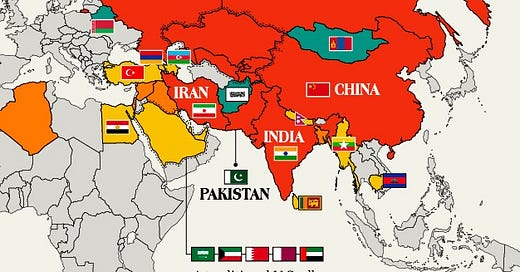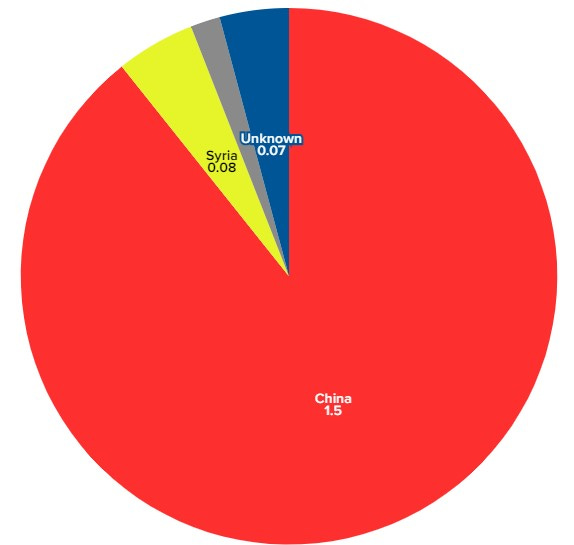“International Sponsors of War.”
The news that makes the headlines, the news that doesn't, and why.
It’s not called a “shadow war” for nothing.
The particular inquiries I’ve been busy with lately have taken up almost every working hour of my life for nearly three weeks. A partial and early result of all this effort appeared in the National Post on Friday, delayed by a couple of days owing to the time it took to put just those bits of the puzzle together.
Here: Iran is the China-funded fulcrum of global terror. But with an election on the horizon, the U.S. isn't inclined to clamp down on the world's most genocidal, warmongering tyrants.
The threads run from Tehran to Shandong and from Moscow to Gaza and back again. Following and fact-checking them all isn’t easy. It’s a story about mass murderers in business suits, ghost ships, and corporate collaborators you’re not supposed to hear about, including major players in Canada’s oilpatch.
It’s about the expanding alliance between Khomeinist Iran, Xi Jinping’s China and Vladimir Putin’s Russia, all tethered to one another within the ever-expanding Shanghai Cooperation Organization. I’ve been following all that for quite a while but it isn’t easy following the money in the maze of lawsuits and terrorist-financing investigations that come and go in Israel, the United States and Europe.
Sometimes the trail goes cold in old cases involving huge sums of money wired to Islamic Jihad and Hamas from Iran and Syria through a Bank of China branch in Guangzhou: in that case it may well have been Benjamin Netanyahu himself who kept the story out of the headlines, by forbidding Mossad from testifying on behalf of the terrorists’ victims.
Sometimes the case is closed, as it was with the Lebanese Canadian Bank and $329 million in Hezbollah drug money wired from Beirut to the United States, laundered in the purchase of fleets of cars that were then re-sold in Africa, with the proceeds routed back to Hezbollah. But that’s just drugs and cars.
The big money comes from oil, and the toughest part is tracking a growing “ghost armada” of dubiously insured, rusting oil tankers flying flags of convenience that are routinely traded back and forth among owners who are often impossible to identify.
The work requires time and effort. The White House doesn’t even want to talk about this stuff, let alone do anything about it, for fear of upsetting oil markets with an election coming up in November. Spikes in oil prices aren’t the kind of thing anyone likes to see in headlines.
After having finally got its act together with that $95 billion foreign aid and national security appropriations bill, the U.S. Congress has handed Biden the power to sanction the living daylights out of anybody dealing with Iran. If he really wanted to, Biden could remove from world markets more than 700,000 barrels of Iranian oil every day.
That’s about half of Iran’s current exports. Between 80 and 90 percent of Iran’s oil ends up in several dozen below-the-radar refineries on the Shandong Coast. The sales earn Iran about $150 million a day.
According to the United States Justice Department, that money finances the “full range of malign activities” the Islamic Revolutionary Guard Corps’ Quds Force is undertaking throughout the Greater Middle East. Ali Khamenei has built up roughly 250,000 armed men in a network of proxies, militias and fully integrated divisions in Gaza, Lebanon, Syria and Iraq, along with terrifying armoury of missiles pointed at Israel, from just across Israel’s norther border. “So, in effect,” says General Michael Kurilla, the head of the U.S. military’s Central Command (CENTCOM), “China is funding Iran’s subversive and malign behavior in the region.”
As I write this, U.S. Secretary of State Antony Blinkin is just returning to Washington from a trip to China. While he was there, the Executive Committee of the Regional Anti-Terrorist Structure of the Shanghai Cooperation Organization (awkwardly shorthanded as SCO RATS) was meeting in St. Petersburg, Russia. They have their own ideas about what terrorism is. It doesn’t include Hamas or Hezbollah.
The 12th international gathering of the High Representatives for Security Issues came together with delegations from 106 countries and several international organizations. Key topic: “Ensuring information security in the context of the development of a polycentric world order.”
It can’t be said that Blinkin spent his entire time in China talking tough to Xi Jinping about his financing of Putin’s wars and Ali Khamenei’s terror operations. Blinkin had time to take in a basketball game and popped into a record store. But there was this bit, which is pretty amusing from a Canadian point of view: Blinken: China seeks to ‘influence and arguably interfere’ with US elections.
The Biden administration has seen evidence of attempts by China to influence the upcoming U.S. elections,Blinken told CNN Friday. Any interference in the U.S. election would be “totally unacceptable,” Blinkin said.
Where have we heard that before?




